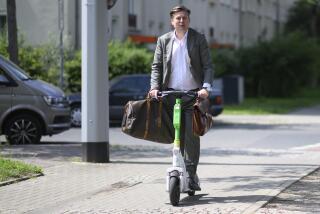To Yeltsin’s Dismay, New Parliament May Be Barely Better Than the Old : Russia: But legislature may be less fearsome than initial vote results indicated.
- Share via
MOSCOW — The new Russian Parliament will be less fearsome than initial vote tallies had indicated but still less compliant than President Boris N. Yeltsin had hoped, according to near-final results released Friday.
It does promise to be even more circus-like than its predecessor, with its august ranks including a television psychic and a renowned strongman.
With about 96% of Russia’s districts reporting, the pro-reform Russia’s Choice bloc appeared to have gained 58 seats in the Duma, the key lower chamber of Parliament, compared to 59 seats for ultranationalist Vladimir V. Zhirinovsky’s party and 74 seats for the Communist Party together with its likely ally, the Agrarian Party.
Russia’s Choice claimed that together with its seats in the upper chamber, the Federation Council, it would be the biggest faction in Parliament.
But for Yeltsin, that is not the point. The essence of the new Parliament’s composition is that it appears to be barely better than the anti-reform bastion he dissolved Sept. 21.
In fact, “the new Parliament will be worse than the one he crushed,” predicted right-wing broadcaster Alexander Nevzorov.
The bad news for Yeltsin began when initial voting returns on half of the Duma showed that Zhirinovsky’s populist harangues had won his party first place among a national list of 13 parties. Because the party list results were the first to be announced, Zhirinovsky’s success dominated election reports, raising the specter that neo-fascism might come to dominate Russian politics.
But as the picture of the new Parliament has filled out, it has come to resemble the old picture. Aside from Zhirinovsky’s unpredictable bloc of seats, reformists are once again badly outnumbered mainly by a mix of Communists and conservative local leaders.
“It was clear right from the start that this was not going to be a pocket Parliament for Boris Yeltsin,” said Viktor Kiselev, a political analyst in the Russian Academy of Sciences’ Institute for Political and Economic Research. “This one is likely to be even more angry.”
Yeltsin may have more hope, however, for the upper chamber, the Federation Council, analysts believe.
An alliance “with the Federation Council is particularly necessary because it could neutralize the dangerous Duma,” presidential political adviser Emil Pain said.
Nikolai Ryabov, chairman of the Central Election Commission, said a full third of the 178 deputies of the Federation Council had not decided which party they represented.
Laws must be approved by both the Federation Council and the Duma, but the two chambers’ functions differ much like those of the U.S. Senate and House of Representatives. The Duma can take a vote of no confidence in the government and initiate the impeachment process; it can also be dissolved by the president in certain cases. The Federation Council votes on martial law and the use of armed forces abroad as well as on high court judges.
Parties are already beginning to scramble to try to form alliances, with Russia’s Choice apparently willing to court even the Communists in order to fight Zhirinovsky. The Communists have been acting coy about their plans, as have many smaller new factions.
“A lot depends on the position that the Communist Party takes,” said Alexander Yakovlev, the architect of former Soviet President Mikhail S. Gorbachev’s reforms. He worries most, he said, that the Communists will unite with Zhirinovsky against Yeltsin because, “in essence, communism is the same as fascism.”
The good news for Yeltsin in all this, however, is that he need not care as much about Parliament altogether as he did before, now that the new constitution has been approved and lawmakers have been deprived of much of their old power. Even if Zhirinovsky gets out of hand, Yeltsin can dissolve the Duma and begin again.
The daily Moskovsky Komsomolets warned Zhirinovsky in print, “The constitution, thank God, passed in the referendum and protects Russia from the fulfillment of your shocking dreams.”
Dissolving the Duma would be a very extreme step. More likely, analysts say, Yeltsin and Russia’s Choice will have to work to forge ad-hoc alliances for each important vote, concentrating on the mass of independents known in Russian political parlance as “the swamp.”
“Very likely, deputies will jump from one camp to another,” Kiselev said. “Thus, alliances will always depend on the particular issue in question.”
Here the wildly varying personalities entering the new Parliament come into play. The lawmakers Yeltsin will be courting include some who are unimaginable as his allies--like the two alleged conspirators indicted for their roles in the 1991 Soviet coup attempt: Vasily A. Starodubtsev and Anatoly I. Lukyanov, the former Speaker of the old Supreme Soviet.
The Yeltsin camp even went through a moment of horror when it appeared that Lukyanov, as the oldest member of Parliament, would have the honor of opening the first session, but it turned out that human rights campaigner Sergei Kovalev was slightly older.
Anatoly Kashpirovsky, the popular faith healer, has made it into the Duma on Zhirinovsky’s list. Also present will be Yuri Vlasov, a two-time Olympic weightlifting medalist who began his political career as a reformist but then took on a more nationalist stripe.
A guaranteed gadfly for Yeltsin will be Eduard Rossel, one of several local governors who were fired but have now been reincarnated in the Parliament.
And then there is Zhirinovsky himself, a spellbinding orator who is sure to try to use his time in Parliament as a springboard for his 1996 bid for the presidency.
Many predict, however, that Zhirinovsky--who advocates Russian expansion to its pre-1917 borders and brutal anti-crime measures--will lose more popularity than he gains as sessions drag on.
More to Read
Sign up for Essential California
The most important California stories and recommendations in your inbox every morning.
You may occasionally receive promotional content from the Los Angeles Times.













